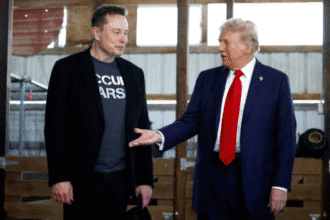Popular Indian comedian Kunal Kamra has not apologized after comments he made during a stand-up performance infuriated Maharashtra’s Deputy Chief Minister, Eknath Shinde. Clips of the jokes, some aimed at him, went viral on social media, prompting strong responses from Shinde’s fans. Political satire and freedom of expression have been hotly debated over the Kunal Kamra Controversy.
Under Shinde’s direction, Shiv Sena members damaged the Mumbai hotel hosting Kamra’s performance. Additionally, legislators from the ruling coalition in Maharashtra filed a police complaint against Kamra, requesting an apology. This episode has sparked much debate on the boundaries of satire in India, with many arguing—especially in a democratic country—that government leaders should be accessible to criticism.
Kamra’s reaction to the backlash?
In a statement issued on Monday night, Kamra said he would “cooperate with the police and courts for any lawful action” taken against him. He asked whether the law would be “fairly and equally deployed against those who have decided that vandalism is the appropriate response to be offended by a joke.”
Police apprehended twelve people following the vandalism; these were subsequently released on bail. Shinde kept his distance from the violence, saying, “The other person should also maintain a certain standard.”
“The Expressiveness of freedom is there. We know what satire is like. There should be a limit, though, Shinde said. The Kunal Kamra Political debate still revolves mostly around controversy. Many have noted, meantime, that the concept of a “limit” on satire remains arbitrary and susceptible to interpretation.
What made Kamra’s show enjoyable?
A renowned name in India’s comic industry, Kamra has developed a reputation for his political humor. Jokes regarding Shinde’s 2022 desertion from the Shiv Sena, which set off a significant political crisis in Maharashtra, dominated his most recent performance, Naya Bharat (New India). The defection separated the party, with Shinde’s section accepted as the legitimate Shiv Sena.
Kamra sang a parody of a Bollywood song, subtly calling Shinde a traitor, a comment that infuriated his followers. The immediate aftermath of the concert was a ransacking of the venue and escalating demands from Shiv Sena workers for Kamra to apologize. The Kunal Kamra Controversy has attracted fresh interest in the conflict between political authority and humor. Many comedians and artists have expressed worries about India’s growing intolerance of political humor.
Reactions of Authorities and Companies?
Often holding stand-up comedy events, the studio Habitat announced it was closing indefinitely. The venue said in a statement that it needed time to figure out “the best way to provide a platform for free expression without putting ourselves and our property in jeopardy.”
Furthermore, claiming suspected building violations, Mumbai’s civic authorities—the Brihanmumbai Municipal Corporation—demolished some buildings at the hotel. This action begged questions about whether the demolition was driven politically. The Kunal Kamra Controversy has heightened discussions on official reactions to satire. Many have charged the government with targeting those who oppose political leaders using civic violations as a cover for their actions.
How Did Officials Respond?
Maharashtra Chief Minister Devendra Fadnavis chastised Kamra and called for an apology. ” None of us oppose speech freedom. We accept political comedy or even satire in general, and we do not view it differently,” he said. But he and Shinde said Kamra was speaking on the opposition’s behalf.
One of Shinde’s party lawmakers even cautioned in a video that Shiv Sena employees would hunt Kamra all around, compelling him to flee India. This comment infuriated many people since many of them questioned whether such threats directed at a comedian were fitting in a democratic nation.
Kamra wouldn’t waver in the face of the challenges. In his statement, he claimed, “As far as I know, it is not against the law to poke fun at our leaders and the circus that is our political system.” He also said he would not “hide under [his] bed” waiting for the uproar to pass. Many have applauded Kamra’s posture as a fearless defense of free expression.
Who are Kamra’s supporters?
Opposition politicians, including Uddhav Thackeray, the head of the Shiv Sena (UBT), supported Kamra for his comments. Thackeray added, “He stated the facts and voiced public opinion.”
Indian comedians have not been without controversy for their work before now. Despite no proof that Munawar Faruqui had spoken the relevant remarks, he was imprisoned in 2021 for charges of damaging Hindu religious sensibilities. Actor and comedian Vir Das also encountered police complaints following a U.S. performance in which he characterized India as a nation of contradictions, saying that people “worship women during the day but gang rape them at night.”
Kamra’s case has spurred debates on whether comedians’ criticism of the government is being specifically targeted. Rising behind him, several public personalities, campaigners, and free speech champions have demanded more rights for satirical artists.
For freedom of expression, what does this imply?
The argument around Kamra draws attention to the developing discussion about Indian freedom of expression. Politicians favor satire, while comedians regularly run legal risks and suffer threats for their material. The case also begs questions about whether authorities implement rules only to stifle criticism directed against people in charge. Many contend that these events have a terrifying effect, discouraging political humor among comedians.
Legal analysts have noted that India’s constitutional protection of free expression covers the freedom to parody political leaders. They also highlight how frequently rules about “hurting sentiments” and defamation have been abused to stifle dissenting opinions.
International groups supporting free expression have also noticed the Kunal Kamra Controversy; some have likened it to crackdowns on comedians under repressive governments elsewhere. The case has generated discussions on social media, with hashtags supporting Kamra trending for days following the event.
Karma doesn’t waver in his position as the political and legal drama plays out; he won’t apologize for his work. “Maybe the system needs to be shaken if a joke can shake the system,” he remarked.
Despite criticism, Kamra has kept doing stand-up because he emphasizes that satire is designed to question authority. For proponents of free speech, his tenacity has made him a symbol of resistance because it shows that comedy is still one of the most effective weapons for challenging authority.








